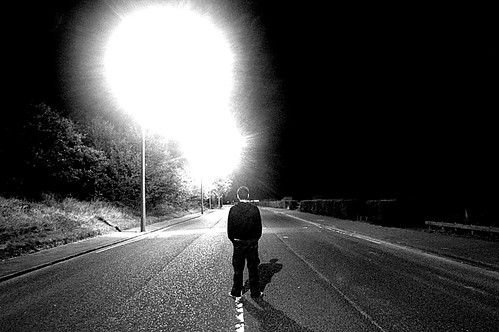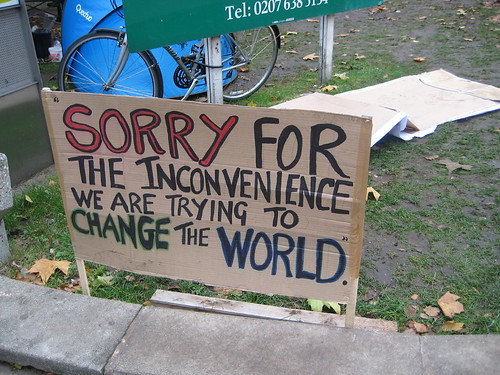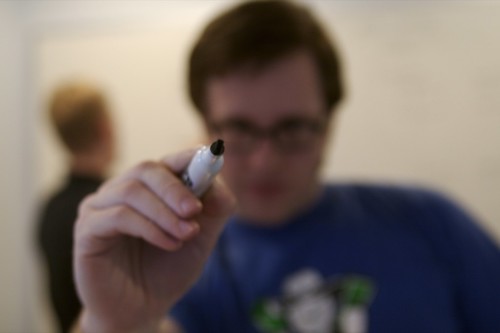6th Sunday of Easter (A)
Picture: cc dadblunders
Sisters and brothers, do you remember when you first learned to ride a bicycle? Do you recall what the process was like? How you gradually learned to balance on two wheels? Usually, children begin by riding tri-cycles. Which don’t require any balance at all. Since the three wheels provide a stable base. Later, the kids may graduate to bicycles fitted with small training wheels. One on each side. Although not as stable as a tricycle, the training wheels provide enough external support to enable the child to remain upright.
But, if the child is truly to learn to ride a bicycle, the training wheels have to come off at some point. Although, for a time, the child may still need an adult to hold on to the bicycle from behind. Then, there comes a moment when even the adult becomes unnecessary. When the child is able to balance on his or her own. Without external support. What a wonderful feeling! How exciting and exhilarating! To finally be able to ride a bicycle on your own!
But notice also what all this involves. Notice how it’s really a process of internalisation. Something external gradually becomes internal. At first, balance is achieved only with outside support. Extra wheels. Extra hands. But then the external supports gradually become unnecessary. Balance begins to come not from without but from within. It’s internalised. This is what it takes to ride a bicycle. The internalisation of balance.
Strange as it may sound, sisters and brothers, internalisation is also something our Mass readings are bringing to our attention today. As you know, in just two weeks time, we will be celebrating Pentecost. And, already today, our readings begin to prepare us for that feast by speaking to us of the Holy Spirit. By inviting us to consider why we need the Spirit. What the Spirit does for us.
We begin with the gospel. Here, as part of his farewell speech at the Last Supper, Jesus reassures his disciples by speaking about the Holy Spirit. Jesus knows that he will soon be taken away from them. He will no longer be present to them in the same way as he is now. And yet, I will not leave you orphans, he tells them. I will come back to you. Jesus will somehow make himself present to them again. But in a different way. Through a process that the Spirit helps to bring about.
We get a better sense of what this process involves by paying attention to a word that Jesus keeps repeating in today’s reading. It’s a very small word. An apparently insignificant word. Neither a noun, nor a verb. Not even an adjective. But only a preposition. Notice how often, in today’s gospel, the Lord uses the word in. The world can never receive the Spirit, Jesus says. Since it neither sees nor knows him; but you know him, because he is with you, he is in you. On that day you will understand that I am in my Father and you in me and I in you.
Isn’t this an indication of what the Spirit does for us? The Spirit helps us to internalise the presence of Jesus. Even the presence of God. Father, Son and Holy Spirit. So that even though we may not see or touch the Lord the way the first disciples did. We can still sense his presence, by the power of the Spirit working within us. Through a process of internalisation.
Isn’t this also what is described in the first reading. When Philip proclaims the Gospel to the Samaritan town, the people are at first attracted by the external signs that Philip performs. We’re told that they united in welcoming the message Philip preached, either because they had heard of the miracles he worked, or because they saw them for themselves. Much like children learning to ride a bicycle, the Samaritans come to an initial reception of the faith by first relying on the external support of miracles. It is only later, after they have received the Holy Spirit, that the faith is gradually internalised.
Sisters and brothers, we know what it looks like when a child is finally able to ride a bicycle without external support. We know what the internalisation of balance looks like. But what does an internalised faith look like? What does it look like when someone no longer has to rely on the external supports of signs and wonders in order to believe? We find an answer to this question in the second reading.
Notice again, how, as in the gospel, we find here the repeated use of the preposition in. Reverence the Lord Jesus Christ in your hearts. Living a good life in Christ. Obviously, the writer presumes that the Christian community he is addressing is living an internalised faith. A faith that comes from within. Rooted in an intimate personal relationship with Christ. Even so, this internalised faith can and needs to be manifested externally. It can and needs to be expressed both in words and in deeds.
Always have your answer ready for people who ask you the reason for the hope that you all have. The hope that is in you. Which means, be ready to express and to explain your faith in words. To proclaim to people the source of your strength. And do it not just in words. But also through your actions. By living with a clear conscience. By living a good life in Christ. By being willing even to suffer for doing what is right. Just as Christ himself, innocent though he was, suffered and died for us.
Sisters and brothers, this is what an internalised faith looks like. This is what the Spirit does for us. It enables us to live in Christ-like ways, even when it’s inconvenient to do so. Even when circumstances may conspire to try to make us lose our balance. Even when we may not see or hear of any miracles being performed. Even when we may end up being penalised or persecuted for doing what is right. As when someone who refuses to backstab others, or to compromise his or her Christian values at work, may end up being side-lined or passed over for promotion.
This is what an internalised faith looks like. Not just living quietly in Christ-like ways, but also being able and willing to explain to others the reason why we live the way we do. Being willing and able to speak about the Mystery that we continue to celebrate in this season of Easter. The joyful Message of the Dying and Rising of Christ. Who continues to be present to us at all times and in all circumstances.
Sisters and brothers, as baptised Christians, all of us have received the gift of the Holy Spirit. All of us are called to proclaim Christ both in deed and in word. Both in good times and in bad. Whether welcome or unwelcome. The question we need to ask ourselves is the extent to which we are truly riding the bicycle of an adult internalised faith. Or are we still pedalling only kids' tricycles today?
But, if the child is truly to learn to ride a bicycle, the training wheels have to come off at some point. Although, for a time, the child may still need an adult to hold on to the bicycle from behind. Then, there comes a moment when even the adult becomes unnecessary. When the child is able to balance on his or her own. Without external support. What a wonderful feeling! How exciting and exhilarating! To finally be able to ride a bicycle on your own!
But notice also what all this involves. Notice how it’s really a process of internalisation. Something external gradually becomes internal. At first, balance is achieved only with outside support. Extra wheels. Extra hands. But then the external supports gradually become unnecessary. Balance begins to come not from without but from within. It’s internalised. This is what it takes to ride a bicycle. The internalisation of balance.
Strange as it may sound, sisters and brothers, internalisation is also something our Mass readings are bringing to our attention today. As you know, in just two weeks time, we will be celebrating Pentecost. And, already today, our readings begin to prepare us for that feast by speaking to us of the Holy Spirit. By inviting us to consider why we need the Spirit. What the Spirit does for us.
We begin with the gospel. Here, as part of his farewell speech at the Last Supper, Jesus reassures his disciples by speaking about the Holy Spirit. Jesus knows that he will soon be taken away from them. He will no longer be present to them in the same way as he is now. And yet, I will not leave you orphans, he tells them. I will come back to you. Jesus will somehow make himself present to them again. But in a different way. Through a process that the Spirit helps to bring about.
We get a better sense of what this process involves by paying attention to a word that Jesus keeps repeating in today’s reading. It’s a very small word. An apparently insignificant word. Neither a noun, nor a verb. Not even an adjective. But only a preposition. Notice how often, in today’s gospel, the Lord uses the word in. The world can never receive the Spirit, Jesus says. Since it neither sees nor knows him; but you know him, because he is with you, he is in you. On that day you will understand that I am in my Father and you in me and I in you.
Isn’t this an indication of what the Spirit does for us? The Spirit helps us to internalise the presence of Jesus. Even the presence of God. Father, Son and Holy Spirit. So that even though we may not see or touch the Lord the way the first disciples did. We can still sense his presence, by the power of the Spirit working within us. Through a process of internalisation.
Isn’t this also what is described in the first reading. When Philip proclaims the Gospel to the Samaritan town, the people are at first attracted by the external signs that Philip performs. We’re told that they united in welcoming the message Philip preached, either because they had heard of the miracles he worked, or because they saw them for themselves. Much like children learning to ride a bicycle, the Samaritans come to an initial reception of the faith by first relying on the external support of miracles. It is only later, after they have received the Holy Spirit, that the faith is gradually internalised.
Sisters and brothers, we know what it looks like when a child is finally able to ride a bicycle without external support. We know what the internalisation of balance looks like. But what does an internalised faith look like? What does it look like when someone no longer has to rely on the external supports of signs and wonders in order to believe? We find an answer to this question in the second reading.
Notice again, how, as in the gospel, we find here the repeated use of the preposition in. Reverence the Lord Jesus Christ in your hearts. Living a good life in Christ. Obviously, the writer presumes that the Christian community he is addressing is living an internalised faith. A faith that comes from within. Rooted in an intimate personal relationship with Christ. Even so, this internalised faith can and needs to be manifested externally. It can and needs to be expressed both in words and in deeds.
Always have your answer ready for people who ask you the reason for the hope that you all have. The hope that is in you. Which means, be ready to express and to explain your faith in words. To proclaim to people the source of your strength. And do it not just in words. But also through your actions. By living with a clear conscience. By living a good life in Christ. By being willing even to suffer for doing what is right. Just as Christ himself, innocent though he was, suffered and died for us.
Sisters and brothers, this is what an internalised faith looks like. This is what the Spirit does for us. It enables us to live in Christ-like ways, even when it’s inconvenient to do so. Even when circumstances may conspire to try to make us lose our balance. Even when we may not see or hear of any miracles being performed. Even when we may end up being penalised or persecuted for doing what is right. As when someone who refuses to backstab others, or to compromise his or her Christian values at work, may end up being side-lined or passed over for promotion.
This is what an internalised faith looks like. Not just living quietly in Christ-like ways, but also being able and willing to explain to others the reason why we live the way we do. Being willing and able to speak about the Mystery that we continue to celebrate in this season of Easter. The joyful Message of the Dying and Rising of Christ. Who continues to be present to us at all times and in all circumstances.
Sisters and brothers, as baptised Christians, all of us have received the gift of the Holy Spirit. All of us are called to proclaim Christ both in deed and in word. Both in good times and in bad. Whether welcome or unwelcome. The question we need to ask ourselves is the extent to which we are truly riding the bicycle of an adult internalised faith. Or are we still pedalling only kids' tricycles today?




